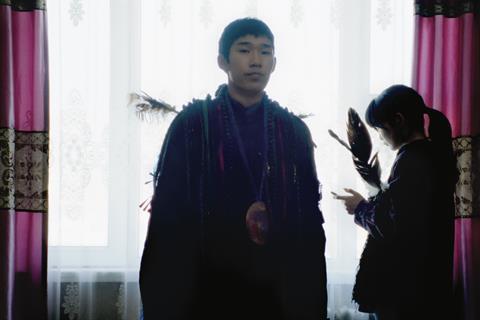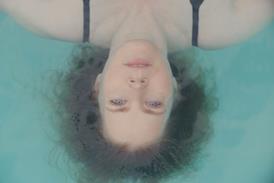Director Lkhagvadulam Purev-Ochir’s feature debut City Of Wind explores life as a young Mongolian in the modern world.

Mongolian director Lkhagvadulam Purev-Ochir returns to Venice (in Horizons) and Toronto (in Centrepiece) with her feature debut City Of Wind, after winning short-film prizes at both festivals last year with Snow In September. It is the first Mongolian feature ever to play at both festivals, and tells the story of a 17-year-old boy, Ze (Tergel Bold-Erdene), who lives between two worlds — falling in love with a girl and studying hard at school, while balancing his community responsibility as a shaman.
The inspiration for the story came from a crisis Purev-Ochir experienced in her twenties, when she felt depressed and burdened. Believing that juggling multiple jobs was to blame — including as a teacher of film history and directing at the Mongolian School of Film, Radio and Television — her mother took her to meet a shaman who, to Purev-Ochir’s surprise, turned out to be younger than herself with a tattoo and an earring. She initially found it difficult to put the two together, but began to understand herself through this encounter.
“The feelings I’m presenting in the film are not about Ze questioning his fate but about him losing faith in himself,” Purev-Ochir says. “His feelings are overwhelmed, with his sexual emotions for the girl, his school being oppressive and his obligations towards the community. I want to document this exact time in Mongolia’s history — about being young and Mongolian and how a young Mongolian feels without dramatising. Their different roles form a mosaic that weaves tradition and modernity together into different emotional landscapes.”
Positive change
Purev-Ochir, who is also known as Dulmaa (short for Lkhagvadulam), feels lucky to be making films now rather than a generation or two ago when the Mongolian film industry was stagnant.
“After Mongolia stopped being communist [in the early 1990s], filmmakers were left on their own and had no knowledge how to finance,” she says. “With digital filmmaking, more arthouse cinema started to appear, but it was more for a tiny audience in Mongolia. Now it’s an exciting moment for Mongolian cinema. The new film law has made it easy to co-produce. Independent films can reach a more global audience. The forecast is looking very good.”
Following the approval of the promotion of cinematography law, the Mongolian National Film Council came into being in April 2022. City Of Wind was among the first recipients of the new Mongolian film support fund, which aims to facilitate Mongolian filmmakers in international collaborations. The film became a six-country co-production between France, Mongolia, Portugal, the Netherlands, Germany and Qatar. Brussels-based Best Friend Forever handles international sales.
Locarno was also crucial in putting Mongolian cinema on the world map when it was included as a focus territory in the Swiss film festival’s Open Doors industry programme. “Mongolia is so far away and isolated. Locarno was a big opportunity when I needed it to get my story out there to different collaborators,” says Purev-Ochir.
She was first invited to join the Open Doors Lab for producers in 2019, where she met French producer Katia Khazak from Aurora Films and Mongolian producer Ariunaa Tserenpil from Guru Media. The trio reteamed the following year (virtually, during the pandemic) when the project was selected for the Open Doors Hub. “Locarno changed the course of the project,” Purev-Ochir recalls. In addition to finding her producers there, she received the project’s first funding when it won the top Open Doors production support grant. Backing from the Hubert Bals Fund and the World Cinema Fund followed as more international co-producers came on board.
Portugal is currently Purev-Ochir’s base, having relocated there six years ago after receiving an Erasmus+ scholarship for KinoEyes, the European film masters’ programme. On graduating, she started a PhD at Lusofona University in Lisbon while writing the script for City Of Wind.
Filming began in October last year, exactly a year after her short Snow In September. Both titles were shot in Mongolian capital Ulaanbaatar, and in between the two shoots she became a mother for the first time.
“The past, present and future of Mongolia is all compressed in the film,” she reflects. “It’s about how we view the world and interact with ancestral spirits, with the future of the city in the distance.”

























No comments yet